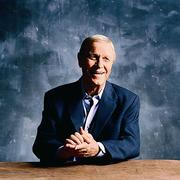Eddy Arnold
把Eddy Arnold称做美国乡村音乐巨星一点都不为过.从他1945年初登舞台到1954年期间,就连续58次进入乡村音乐排行榜前10名.在最初的21年演唱生涯中,从没有不上过前40名的排行榜.他有140多张唱片上榜,销售量达到850多万张.人们把他叫做"田纳西的乡巴佬"(Tennessee Plowboy),一点不假,他确实当过田纳西的农夫.Richard Edward Arnold是他的全名,他于1918年5月15日出生于田纳西州的Henderson.他是一名佃户的儿子,在田纳西的农村长大.他父亲是一名乡村小提琴手,发现了儿子的音乐天赋,攥了足够的钱,在儿子10岁生日时给他买了百吉他.小儿子最初的表演是在小学,当他读到中学时已经成为了当地的小歌星.在经济萧条时期,Eddy不得不离开学校,到农场上干活,他也当过墓地工人。他的演出只是在一些丧葬场合,这时他会骑者着毛驴背着吉他去表演.象当时许多歌星一样,Eddy到电台演唱使自己成名.他在1936年开始在田纳西的杰克逊(Jackson)电台唱歌,成为一名地区性的歌星,后来又在密苏里州的圣露易斯(St.Louis)工作过.从1940年到1943年他和Pee Wee King合作在大剧院(Grand Ole Opry)中演出.1944年他与维克多唱片公司(Victor Records)签约,开始用"田纳西乡巴佬和他的吉他"这个名字,这个名字直到1945年都出现在他的唱片上.Eddy的第一张上榜唱片是这首歌名列排行榜第5,后来连续58次荣登最流行10首歌曲榜.1947年Eddy3首歌均名列榜首:,和.最后这首歌在榜上名列第一达21周之久.第二年,Eddy的两首名曲又上榜首,这就是和.此时他还有歌曲上Billboard流行歌曲榜,这样他就成为第一名真正的乡村歌曲和流行歌曲双栖歌手.他想利用更为复杂的乐器旋律伴奏来赢得更广泛的听众.他说:"从伴奏角度说,我的乐队太小了,搞不出什么名堂.我必须改进。我的歌很有韵律,我需要改善一下背景音乐.我改进了小提琴和鼓的伴音."Eddy成为一名长期不衰的远近闻名的歌星,50年来都有歌曲上榜,到60年代,他还有歌曲荣登榜首,而到80年代,也有歌曲进入最流行10首歌曲排行榜。这些歌曲包括一些经典歌曲如,和他断断续续演唱了7年以后,在1990年又回到了录音棚.Eddy Arnold moved hillbilly music to the city, creating a sleek sound that relied on his smooth voice and occasionally lush orchestrations. In the process, he became the most popular country performer of the 20th century, spending more weeks at the top of the charts than any other artist. Arnold not only had 28 number one singles, he had more charting singles than any other artist. More than any other country performer of the postwar era, he was responsible for bringing the music to the masses, to people who wouldnt normally listen to country music. Arnold was initially influenced by cowboy singers like Gene Autry, but as his career progressed, he shaped his phrasing in the style of Pete Cassell. Nevertheless, he was more of a crooner than a hillbilly singer, which is a large reason why he was embraced by the entertainment industry at large, and frequently crossed over to the pop charts. Arnolds career ran strong into the 90s. Although his records didnt dominate the charts like they did during the 40s and 50s, he continued to fill concert halls and reissues of his older recordings sold well.Raised on a farm in Tennessee, Arnold was given a guitar at the age of ten by his mother. His father, who had played fiddle and bass, died the following year. Arnold left school so he could help out on the farm. However, he began playing dances whenever he had a chance. Several years later, he made his first radio appearance on a station in Jackson. Arnold then moved to St. Louis, where he played in nightclubs with fiddler Speedy McNatt. In St. Louis, Arnold landed a regular spot on WMPS Memphis, spending six years at the radio station. Through the show, the singer earned a dedicated following of fans.During World War II, Eddy Arnold became part of R.J. Reynolds Camel Caravan, which featured Redd Stewart, Pee Wee Kings Golden West Cowboys, Minnie Pearl, and San Antonio Rose. The troupe performed for U.S. troops throughout America, as well some selected dates in Panama. After the Camel Caravan, Arnold became the featured singer in the Golden West Cowboys while they performed on the Grand Ole Opry. At first, he appeared under the name the Tennessee Plowboy, a nickname that followed him throughout his career.Arnold recorded his first single, Mommy Please Stay Home With Me, in 1944 for RCA Victor. At RCA, the singer received the guidance of the labels A&R head, Steve Sholes, which proved to be invaluable help for his career.Eddy Arnold pursued a solo career in 1945, the same year he got married to Sally Gayhart. Each Minute Seems a Million Years, released on RCAs Bluebird division that same year, became his first charting record, peaking in the Top Five. Arnolds career really took off the following year, when Thats How Much I Love You peaked in the Top Three, staying there for 16 weeks and selling over 650,000 copies; its flip side, Chained to a Memory, also climbed into the Top Three. Arnold followed the singles success with two number one hits in 1947, What Is Life Without Love and Its a Sin. However, that didnt compare to the success of his next record, Ill Hold You in My Heart (Till I Can Hold You in My Arms). The single spent 46 weeks on the charts, with 21 of those weeks spent at the top; it also crossed over to the pop charts, reaching the Top 30. In the process, it became the number one single of the decade.Ill Hold You in My Heart confirmed that Arnold had become a country superstar, as did the performance of his 1948 singles. All of his nine singles went into the Top Five, and five of them went to number one, including Anytime, What a Fool I Was, Texarkana Baby, Just a Little Lovin (Will Go a Long, Long Way), My Daddy Is Only a Picture, and Bouquet of Roses, which stayed at the top for 19 weeks. In total, Arnold racked up over 40 weeks on top of the charts during 1948, becoming the number one country star in America. He headlined all the radio shows and concerts he appeared on, and he was in demand throughout the nation. By the end of the year, Colonel Tom Parker had become his manager; Parker would later become Elvis Presleys manager. Throughout 1949, he continued to dominate the charts, releasing a succession of Top Ten singles, including the number one Dont Rob Another Mans Castle, One Kiss Too Many, Im Throwing Rice (At the Girl I Love), and Take Me in Your Arms and Hold Me.Eddy Arnold became a familiar face not only to country fans but also to the general public in the early 50s. He toured all of the U.S., as well as several foreign countries. All of the major television shows of the era, including The Perry Como Show and Arthur Godfreys Talent Scouts, featured the singer. Indeed, he became so popular that he was the first country star to have his own television show, Eddy Arnold Time. The show originally aired on NBC, but it later moved to ABC. Through all of this, his string of Top Ten hits remained unbroken, even though he didnt have another crossover pop hit until 1954. Nevertheless, the sheer amount of country hits was overwhelming: In 1950 he had seven, and 13 in 1951 (including the number ones Theres Been a Change in Me, Kentucky Waltz, I Wanna Play House With You, Easy on the Eyes, and A Full Time Job). The hits, including Eddys Song (composed of the titles of previous hits), Hows the World Treating You?, I Really Dont Want to Know, My Everything, The Cattle Call, That Do Make It Nice, Just Call Me Lonesome, and The Richest Man (In the World), continued to come in force until 1956.Between 1956 and 1964, Arnold continued to chart, but he wasnt reaching the Top Ten at the same frequency of the previous decade. During this time, his style was beginning to change, as he was shedding his rootsy style for a slicker, polished sound that was more appropriate for urban settings than rural territories. Arnold became a crooner, complete with subdued instrumental backings, highlighted by gentle steel guitars and the occasional orchestra. The change in musical direction was a major commercial success, sparking a new era of chart dominance that began in 1965 with Whats He Doing in My World. Not only did he return to the top of the country charts, he once again crossed over to the pop charts. Arnolds second streak of major hits ran until 1969. During this time, he earned several number one and Top Ten singles, all of which were pop hits as well, including Make the World Go Away, I Want to Go With You, The Last Word in Lonesome, Somebody Like Me, Lonely Again, Turn the World Around, Then You Can Tell Me Goodbye, They Dont Make Love Like They Used To, and Please Dont Go.In the early 70s, Arnold continued to appear on the country charts, although his pop hits dried up. The singer signed with MGM in 1972, ending 27 straight years at RCA. Arnold spent only four years at MGM, landing only one major hit, 1974s I Wish That I Had Loved You Better. Returning to RCA in 1976, he closed out the decade with two hits — Cowboy (1976) and If Everyone Had Someone Like You (1978). Arnold managed to put two songs into the Top Ten in 1980 (Lets Get It While the Gettins Good, Thats What I Get for Loving You), making him one of the few artists who charted in five different decades. He continued to record in the 90s, although without charting a hit single. Nevertheless, his concert and television appearances remained popular.Beginning in the 60s, Eddy Arnold was bestowed with a numerous amount of awards. In 1966, he was inducted into the Country Music Hall of Fame. The following year, he was the first Entertainer of the Year named by the CMA. The ACM gave him the Pioneer Award in 1984; three years later, the Songwriters Guild gave him its Presidents Award. Perhaps the truest gauge of his success is his record sales. Over the course of his career, he has sold over 85 million records, making him one of the most successful artists of the 20th century. His 100th album, After All These Years, was released in 2005 by RCA Records.


 Smokey The Bear - Eddy Arnold
Smokey The Bear - Eddy Arnold




























![[STATION] aespa《Dreams Come True》MV Teaser - aespa (에스파)](https://img2.kuwo.cn/wmvpic/324/79/54/2120387380.jpg?imageView2/1/w/195/h/130/format/jpg/q/60)





